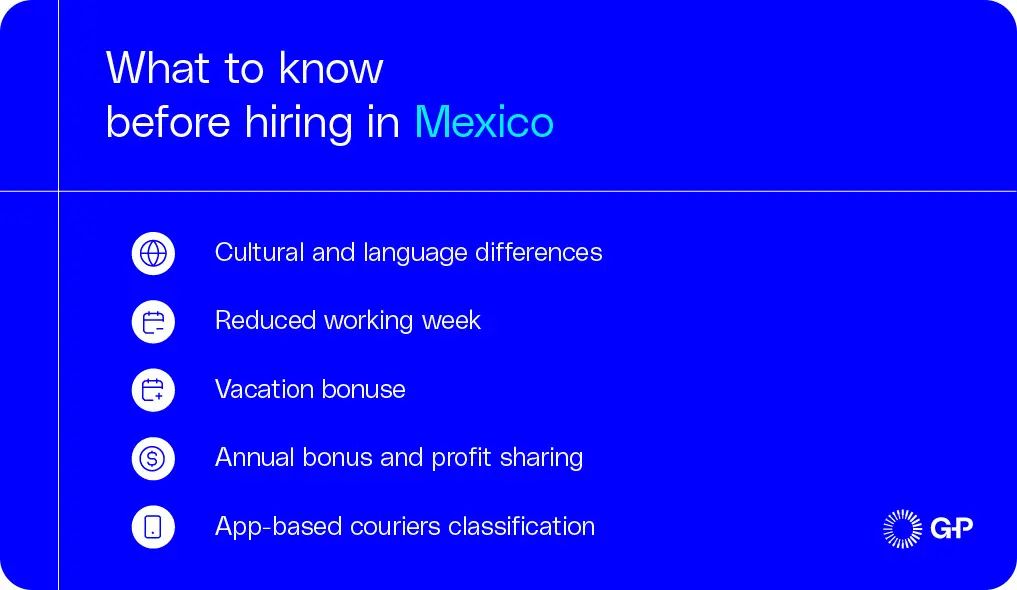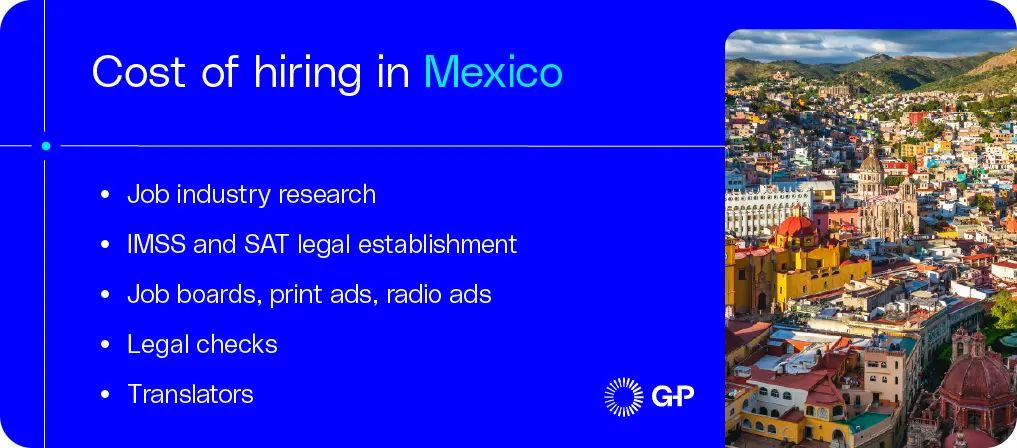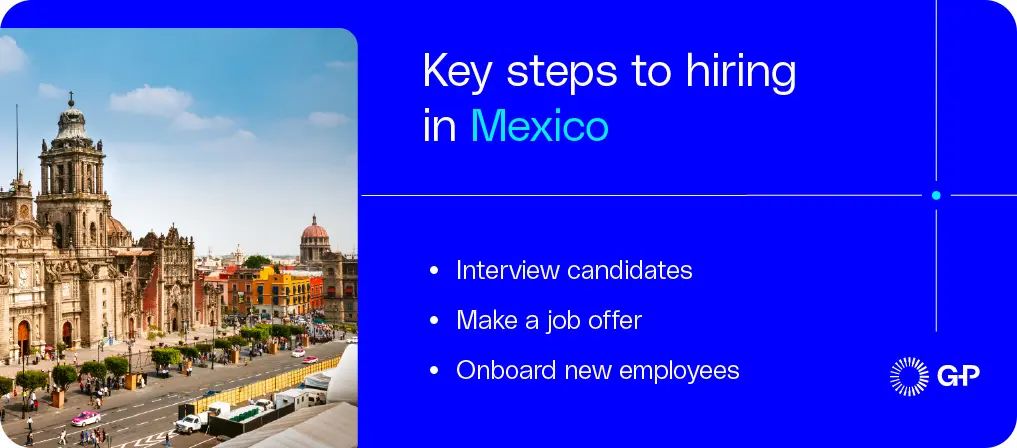With a population of approximately 131,946,900 people, Mexico is the eleventh most populated country in the world. It has the largest population of Spanish speakers globally and a skilled workforce in automotive manufacturing, aerospace, IT, and electronics.
If you’re looking to hire employees in Mexico, our guide can walk you through the process.
What to know before hiring in Mexico

If you’re expanding your business into Mexico for the first time, there are important legal requirements to be aware of. These norms and laws influence hiring practices in Mexico and many aspects of the employer-employee relationship.
If you’re unsure where to begin, G-P Gia™, our AI-powered global HR agent, can answer your toughest compliance questions across 50 countries — including Mexico — and all 50 U.S. states. Reduce your reliance on outside counsel and cut the time and cost of compliance by up to 95% with Gia.
Let’s take a look at seven things to know about hiring in Mexico.
1. Language diversity
Mexico has 69 national languages, including Spanish. The majority of the population speaks Spanish. It’s the default language for all governmental and legal proceedings. Some people also speak an indigenous language and/or English. English proficiency is higher in border states like Nuevo León.
Spanish is the fourth most spoken language in the world. So Mexico can be a strategic entry point to connect with over 500 million Spanish speakers globally. Keep in mind that there are distinct differences between Mexican Spanish and Spanish used in other countries, such as Spain.
2. Employment contracts
At-will employment doesn’t apply in Mexico. Employment agreements are mandatory. While verbal agreements can establish an employment relationship and protect employee rights, terms and conditions of employment must be documented in a written contract. That said, you should create an employment contract that includes the employee’s personal details and job details.
One of the most important terms is the contract duration. There are three types of contract durations: indefinite, project, and seasonal. Most contracts are indefinite, meaning they don’t set an end date for the job. Workers in Mexico are protected by the Mexican Labor Law. Any contract term that violates these rights will be invalid.
One of the reasons employment contracts are so important in Mexico is because there’s no unemployment insurance. Employees are entitled to severance if they’re dismissed without just cause. So the contractual agreement provides some stability to employees. If an employee quickly proves to be unfit for the job, you can terminate their employment during a probationary period without repercussions.
G-P EOR has an Employment Contact Generator to help you draft compliant employment contracts that meet all legal requirements and best practices in Mexico.
3. Workweek and minimum wage
Mexico defines three different working shifts. The day shift, when most office employees work, is 48 hours per week, usually spread across six days. Employees are entitled to one rest day, typically Sunday, and a minimum 30-minute break during the workday. Some companies may choose to condense 48 hours into a Monday through Friday week, or require fewer hours than the standard 48 hours. The government has announced plans to gradually reduce the workweek to 40 hours by 2030.
Employees who work more than 48 hours over the six workdays get overtime pay for these extra hours. There’s a cap on overtime hours to ensure workers’ well-being. In 2025, Mexico raised the general minimum wage to MXN 278.80 per day. The minimum wage in the Northern Border Free Zone increased to MXN 419.88.
4. Required leave
Mexico has seven national holidays with an eighth holiday for election day every six years. Employees are entitled to these days off. In addition, employees get twelve days of paid vacation after one year of service. After that, they get two more vacation days per year. After six years of service, vacation days increase by two every five years.
In addition to being paid their normal salary while on vacation, employees also get a vacation bonus, or prima vacacional. This bonus must be at least 25% of their standard pay. While on sick leave, however, employees only receive a portion of their usual salary.
You can easily administer benefits plans with G-P EOR. Our in-house experts continuously monitor employment laws to meet country-specific regulations and norms. Build and manage benefits plans through our platform to provide a smooth employee experience.
5. Annual bonus and profit sharing
An annual bonus near the Christmas holiday is legally required in Mexico. Employers must give employees what is known as an aguinaldo, or 13th salary, each year by December 20. Companies that skip this requirement will incur heavy fines. The aguinaldo should be the equivalent of 15 days’ wages.
Another bonus Mexico workers are entitled to is profit sharing. After a company has been in operation for one year, they must share 10% of their pre-tax profits with employees.
6. Paycheck withholdings
Employers in Mexico withhold income tax from employees’ paychecks. This is part of the impuesto sobre la renta (ISR), a progressive income tax applied to employee earnings. Employers must calculate and withhold the appropriate amount of ISR based on the employee's integrated salary, which includes base wages, bonuses, and other taxable benefits. The withheld amounts are then remitted monthly to the Mexican Tax Administration Service (SAT).
Employers must also withhold a certain amount for social security benefits. Employers contribute the majority toward social security, which generally ranges from 22% to 38%, but employees also contribute a portion.
7. App-based couriers classification
In Mexico, couriers who work through app-based platforms are considered employees of those platforms. This law aims to protect couriers and the industries involved with digital platforms. Digital platforms that act as employers must clearly outline working conditions in writing and follow the Federal Labor Law's rules for employment agreements.
However, only couriers whose average daily earnings meet or exceed Mexico's daily minimum wage are eligible for social security and benefits. Couriers who don’t meet this monthly minimum are classified as independent workers. They only receive basic insurance for personal accidents, regardless of income.
Top hiring hubs in Mexico
Some Mexican cities are known for particular industries. Knowing what each city has to offer can help you channel your hiring efforts to the right place and fill roles faster.
The top talent hubs in Mexico are:
-
Mexico City is the capital and largest city. It has a large and diverse workforce and is the central finance and business hub. Key industries include technology, e-commerce, and manufacturing.
-
Monterrey has a strong industrial base. It’s a major center for manufacturing, particularly in the automotive, machinery, consumer electronics, glass, steel, and cement sectors.
-
Guadalajara is known as the Silicon Valley of Mexico. The city is a leader in technology, software development, electronics manufacturing, and call centers.
-
Tijuana is an important city for manufacturing, especially for maquiladoras. These are manufacturing plants in Mexico with the parent company's administration facility in the U.S. Maquiladoras allow companies to capitalize on Mexico's workforce and also benefit from doing business in the U.S.
-
Querétaro is growing quickly in the aerospace, automotive, and technology sectors. The city attracts national and international companies and has a strong talent base in engineering.
-
Puebla is a key center for the automotive and manufacturing industries, with major plants from Volkswagen and Audi.
Key industries in Mexico
Understanding Mexico’s main industries helps you benchmark salaries and benefits. You can use this insight to make smart choices about where to invest and grow your workforce. The main industries in Mexico include:
-
Automotive manufacturing: Mexico is one of the world's largest producers of vehicles and auto parts. Major car manufacturers like General Motors, Ford, Volkswagen, Nissan, Toyota, BMW, and Mercedes-Benz have plants and research facilities in the country. Key roles in this sector include manufacturing engineers, electrical engineers, and mechanical engineers.
-
Aerospace: The aerospace industry is growing, especially in Querétaro, where companies make aircraft parts and offer maintenance services. Bombardier and Boeing have set up production facilities here. Important roles include engineers, welders, and assemblers.
-
Electronics and electrical equipment: Mexico exports electronics, such as televisions, computers, and telecommunications gear. Companies like Samsung, LG, and Sony have manufacturing plants in Mexico. This field requires various engineering specialists.
-
IT: Information technology is expanding, with many companies focusing on software development, mobile applications, cloud services, and cybersecurity. Guadalajara is a key tech center. Important roles include software developers, data scientists, and cloud architects.
Oil and gas: Mexico has large oil reserves and a well-established petroleum industry, which includes extraction, refining, and petrochemicals. The company PEMEX is the most significant player in this sector. Key roles include engineers, geologists, and drilling and well operations specialists.
The cost of hiring an employee in Mexico

Whether you’re hiring one employee or an entire team in Mexico, expenses are inevitable. Budget for the following:
-
Research: Determine where in Mexico you want to establish your business, and research the legalities that relate to employment practices there, as well as any requirements for your industry.
-
Legal establishment: Unless you work with an Employer of Record (EOR), you’ll need a legal business entity in Mexico that’s registered with the Mexican Institute of Social Security (IMSS) and the SAT. Establishing either a branch or subsidiary will cost you financially.
-
Job boards: Posting your job ad on either public job boards or industry-specific ones can also cost you, though you may find free options.
-
Legal checks: Background checks are legal in Mexico but require prior written consent from the candidate and must comply with data protection laws. Taking time to check applicants’ paperwork and ensure they have a legal right to work in Mexico can also add to your total cost.
-
Translator: If you’re evaluating applications and interviewing candidates who speak Spanish, and this isn’t your first language, consider enlisting the help of a translator. A translator can help with in-person and virtual communication, but this adds to your hiring costs.
According to G-P Verified Sources from Gia, the total annual employer burden rate in Mexico, which includes costs triggered on top of salaries, is between 24% and 38%. The exact rate depends on the employee’s salary, the employer’s occupational risk classification, and the state payroll tax rate. Gia leverages G-P’s 13+ years of global employment experience, along with insights from almost a million real-world scenarios, to provide accurate, up-to-date employment law information.
What does a company need to hire employees in Mexico?
Make sure you cover these essentials before expanding your team in Mexico:
-
A branch or subsidiary: If you want to establish a legal presence in Mexico, you’ll need to set up a branch or subsidiary. A branch is an extension of your company, while a subsidiary functions more independently. To hire full-time employees in Mexico without setting up your own entity, use G-P EOR. You can build your team in Mexico at a lower cost and with peace of mind that you’re doing so compliantly.
-
Legal documents: All documentation you submit to establish your company legally will be in Spanish. If you don’t have an employee who can create these documents and read the instructions from the Mexican government, you’ll need a translator. Ideally, you should have an attorney in Mexico to help you create these documents, such as your deed of incorporation. You’ll also need to have your documents notarized.
-
Registrations: You’ll have to register your business with a host of government agencies, starting with registering your business’s name with the Ministry of External Affairs (SRE). You’ll also need to register with the National Business Information Registry from the Department of Trade, the SAT, the IMSS, and the National Workers Housing Fund (INFONAVIT). You may also have to register with the Department of Trade Foreign Investment Register.
Permits: Depending on your branch or subsidiary’s location and your industry, you may also need to obtain necessary permits from local governments. Make sure you obtain any necessary permissions at both national and local level.
Steps to hiring in Mexico

The hiring process in Mexico is similar to the one you’re likely familiar with in your own country. Here are the five basic steps of the hiring process in Mexico:
1. Post job ads
First, create a job ad that outlines the details of the position, including whether it’s remote or in-office, expected job duties, necessary qualifications, and more. Include language requirements or preferences. Post your job ad in various spots, including online job boards.
2. Evaluate applications
As applications come in, you can begin screening and determine who you’ll contact for an interview. You can use software or an agency to assist with this step if you want a short-list of candidates quickly.
3. Interview candidates
Next, interview candidates who made it onto your shortlist. You can conduct interviews virtually or in person. Phone or video interviews are especially helpful if you’re hiring remote employees in Mexico and want to avoid traveling there.
When scheduling remote interviews, consider the time difference. Mexico has four standard time zones. Find out if there’s a time difference with the job applicant, and schedule the interview accordingly.
4. Make the job offer and create a contract
Once you’ve interviewed candidates and determined who you want to hire, it’s time to send your chosen candidates formal job offers.
You should also create a contract at this point. This is a critical aspect of employment in Mexico, so make the contract as detailed as possible. It must include the employee’s personal information, like marital status, along with the expectations for the role, and compensation and benefits.
5. Onboard your new hire
Lastly, you can begin the onboarding process. Ask new hires to fill out all the necessary paperwork, both for the Mexican government and for your organization, so you can add them to payroll. You can streamline the entire employee lifecycle — including payroll — for your team members in Mexico with G-P EOR. Pay your global teams in 150 currencies and easily add bonuses, commissions, and exceptions in just a few clicks.
Hiring contractors in Mexico
Working with independent contractors in Mexico can be a cost-effective way to test the market and build a presence without the commitment of full-time employees. Contractors based in Mexico understand local consumer behavior, rules, and business practices. They’ll be ready to start working quickly with their own equipment and established work processes.
Hiring contractors allows you to easily adjust your workforce based on your business needs, without the complexities and costs of employment.
Before you enter an agreement with an independent contractor in Mexico, consider the following:
1. Employees vs. independent contractors
It’s important to understand the difference between employees and independent contractors. In Mexico, employers hire employees to do work and, in return, pay them a regular salary and benefits. Independent contractors provide services. Unlike employees, contractors set their schedules, use their own equipment, and work on specific projects, rather than having an ongoing role.
2. Penalties for misclassification
Classifying someone as a contractor when they aren’t can lead to severe penalties. If misclassification occurs, you may need to:
-
Pay fines ranging from 250 to 5,000 times the daily minimum wage per violation.
-
Provide back pay for salaries, statutory benefits, and social security contributions.
-
Face criminal penalties, including fines and possible imprisonment for intentional evasion of labor obligations.
3. How to pay contractors in Mexico
G-P Contractor™ takes away the messy, time-consuming process of hiring and paying international contractors. You can create and issue contracts and pay contractors with just a few clicks, all while ensuring a compliant process.
Hire employees and contractors in Mexico with G-P
Our SaaS and AI-powered products – EOR, Contractor, and Gia – help companies of all sizes hire, onboard, and manage global teams in 180+ countries.
With more than a decade of experience, the largest team of HR, legal, and compliance experts, and a global proprietary knowledge base, G-P is the recognized leader in global employment.
Make your expansion to Mexico easier with G-P. Contact us or book a demo today.















